
SIBNAYAL 24 mEq PROLONGED-RELEASE GRANULES

How to use SIBNAYAL 24 mEq PROLONGED-RELEASE GRANULES
Translated with AI
This page provides general information and does not replace a doctor’s consultation. Always consult a doctor before taking any medication. Seek urgent medical care if symptoms are severe.
Show originalContents of the leaflet
Introduction
Package Leaflet: Information for the User
Sibnayal 8 mEq prolonged-release granules
Sibnayal 24 mEq prolonged-release granules
potassium citrate/potassium acid carbonate
Read all of this leaflet carefully before you start taking this medicine because it contains important information for you.
- Keep this leaflet, you may need to read it again.
- If you have any further questions, ask your doctor or pharmacist.
- This medicine has been prescribed for you only. Do not pass it on to others. It may harm them, even if their signs of illness are the same as yours.
- If you get any side effects, talk to your doctor or pharmacist. This includes any possible side effects not listed in this leaflet. See section 4.
Contents of the pack
- What is Sibnayal and what is it used for
- What you need to know before you take Sibnayal
- How to take Sibnayal
- Possible side effects
- Storage of Sibnayal
- Contents of the pack and other information
1. What is Sibnayal and what is it used for
Sibnayal contains two active substances, potassium citrate and potassium acid carbonate (also known as potassium bicarbonate).
Sibnayal is an alkalizing medicine used to control blood acidity caused by a kidney disease called distal renal tubular acidosis (dRTA).
Sibnayal will help reduce the effect of dRTA on your daily life.
Sibnayal is used in adults, adolescents, and children over 1 year of age.
2. What you need to know before you take Sibnayal
Do not take Sibnayal
- if you are allergic to potassium citrate or potassium bicarbonate or any of the other ingredients of this medicine (listed in section 6),
- if you have severe kidney disease or kidney failure,
- if you have high potassium levels in your blood (hyperkalemia).
Warnings and precautions
Talk to your doctor before taking Sibnayal
- if you have a disease or take a medicine that may increase potassium levels in your blood (see section "Other medicines and Sibnayal"),
- if you frequently have gastrointestinal symptoms such as abdominal distension, diarrhea, nausea, or vomiting,
- if you have chronic kidney disease.
The prolonged-release granules of Sibnayal are designed to release the active substances slowly after taking the medicine. It is possible to observe remnants of the granules in the stool. This is normal and does not reduce the effectiveness of the medicine.
If you vomit within 2 hours of taking the medicine, you should take another dose.
Medical supervision is required when using this medicine.
Your doctor will regularly check your kidney function if you are elderly or if your kidney function worsens.
Children
Do not give this medicine to children under 1 year of age because there is a risk of choking.
Other medicines and Sibnayal
Tell your doctor or pharmacist if you are taking, have recently taken, or might take any other medicines.
Some medicines may affect how Sibnayal works or may cause side effects more easily. These include:
- any medicine that increases potassium levels in the blood, such as:
- angiotensin-converting enzyme (ACE) inhibitors (used to treat high blood pressure, heart disease, and kidney disease in patients with type 1 diabetes),
- potassium-sparing diuretics (used to treat high blood pressure, fluid retention in tissues [edema], and heart disease),
- potassium supplements (used to prevent or treat low potassium levels in the blood),
- cyclosporin (used to prevent or treat transplant rejection),
- sodium heparin (used to prevent or delay blood clotting),
- non-steroidal anti-inflammatory drugs (NSAIDs) (used to reduce fever, pain, and inflammation),
- any medicine that may be affected by changes in potassium levels in the blood, such as:
- digitalis glycosides (such as digoxin, used to treat heart failure and certain heart rhythm disorders),
- corticosteroids (used to treat inflammation),
- any other medicine that may cause heart rhythm disorders, such as:
- amiodarone and quinidine (used to control heart rhythm),
- chlorpromazine (used to treat certain mental illnesses),
- cisapride (used to treat heartburn),
- esparfloxacine (used to treat certain bacterial infections).
Some medicines may be affected by the increased pH of the urine related to Sibnayal treatment, such as:
- salicylates (used to treat pain and inflammation, medicines similar to aspirin),
- tetracyclines (used to treat certain bacterial infections),
- barbiturates (sleeping medicines).
Using Sibnayal with food, drinks, and alcohol
Do not mix Sibnayal with food or hot liquids.
Do not consume alcohol during treatment with Sibnayal.
Pregnancy, breastfeeding, and fertility
If you are pregnant or breastfeeding, think you may be pregnant, or are planning to have a baby, ask your doctor or pharmacist for advice before taking this medicine.
Driving and using machines
Sibnayal is unlikely to affect your ability to drive or use machines.
Sibnayal contains potassium
Sibnayal 8 mEq contains 308 mg of potassium per sachet. This should be taken into account if you have kidney failure or are on a potassium-controlled diet.
Sibnayal 24 mEq contains 924 mg of potassium per sachet. This should be taken into account if you have kidney failure or are on a potassium-controlled diet.
3. How to take Sibnayal
Take this medicine exactly as your doctor has told you. If you are not sure, ask your doctor or pharmacist.
The amount of Sibnayal to be taken will depend on the age, weight, and condition of the patient. Your doctor will prescribe the exact dose of Sibnayal to be taken. It will always be one or more whole sachets of medicine.
It is possible that your doctor may need to adjust the dose of Sibnayal.
This medicine requires medical supervision.
Dosage
Your doctor will adjust the dose based on the bicarbonate levels in your blood.
How to use Sibnayal
Sibnayal should be taken orally (by mouth).
If you are not sure how to use Sibnayal, ask your doctor or pharmacist.
- Hold the sachet vertically and hold it with your fingers above the dotted line. Shake it well from side to side to make sure all the contents are moved to the bottom of the sachet.
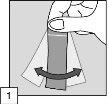
- Cut the sachet along the dotted line, using scissors if necessary.
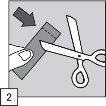
- Put all or part of the contents of the sachet directly into your mouth onto your tongue.
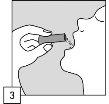
- Swallow the granules immediately with a large glass of water. Do not chew or crush the granules. Repeat steps 1 to 4, as necessary, until the full dose has been taken.
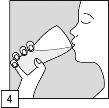
For patients who cannot swallow the granules
- Mix Sibnayal with a small amount of soft, cold food (such as fruit puree or yogurt) directly in the spoon. Swallow the mixture of medicine and food immediately. Do not keep the mixture for later use.
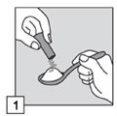
- Put the mixture directly into your mouth and swallow it without chewing. Make sure no Sibnayal is left in your mouth. Repeat steps 1 and 2, as necessary, until the full dose has been taken.
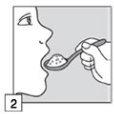
Do not mix the granules with liquid before taking them.
When to take Sibnayal
Sibnayal should be taken in the morning and at night, during a meal. You should leave an interval of about 12 hours between the two doses to cover the day and night.

Dose adjustments
The dose will be gradually increased or decreased over several weeks. Your doctor will adjust the dose based on your condition. The recommended dose is usually 4 to 6 complete sachets of 24 mEq per day.
If you notice any side effects, talk to your doctor, as it may be necessary to adjust the dose of this medicine.
Switching from another alkalizing medicine to Sibnayal
When switching from another alkalizing medicine to Sibnayal, your doctor should closely monitor the transition.
If you take more Sibnayal than you should
Talk to your doctor or pharmacist if you have taken more Sibnayal than you should.
You may feel nauseous, need to vomit, and have diarrhea.
If you have taken a large amount of Sibnayal, you may feel weak or have unexplained muscle stiffness, spasms (muscle contraction), abnormal tingling or burning sensation, numbness or tingling, mental confusion, or abnormal heart rate.
If you forget to take Sibnayal
Do not take a double dose to make up for a forgotten dose. Take it as soon as you remember. However, if it is less than 6 hours until the next dose, skip the forgotten dose. Do not take more than two doses per day.
Talk to your doctor if you have forgotten to take one or more doses.
If you stop taking Sibnayal
This medicine is for long-term treatment. It will only be effective if you take it.
Do not stop treatment unless your doctor tells you to, even if you feel better, as your disease may worsen. If you want to stop treatment, talk to your doctor first.
If you have any further questions on the use of this product, ask your doctor.
4. Possible side effects
Like all medicines, this medicine can cause side effects, although not everybody gets them.
Very common side effects(may affect more than 1 in 10 people)
- abdominal pain (stomach pain)
Common side effects(may affect up to 1 in 10 people)
- upper abdominal pain (pain in the upper part of the stomach)
- abdominal and gastrointestinal disorders (abdominal and intestinal disorders),
- dyspepsia (indigestion),
- vomiting,
- diarrhea,
- nausea when starting treatment.
Reporting of side effects
If you experience any side effects, talk to your doctor or pharmacist. This includes any possible side effects not listed in this leaflet. You can also report side effects directly via the national reporting system listed in Appendix V. By reporting side effects, you can help provide more information on the safety of this medicine.
5. Storage of Sibnayal
Keep this medicine out of the sight and reach of children.
Do not use this medicine after the expiry date which is stated on the sachet and the carton after EXP. The expiry date is the last day of the month stated.
Do not store above 30°C.
After opening a sachet, discard the unused contents.
Medicines should not be disposed of via wastewater or household waste. Ask your pharmacist how to dispose of medicines no longer required. This will help protect the environment.
6. Contents of the pack and other information
Composition of Sibnayal
The active substances are potassium citrate and potassium acid carbonate (also known as potassium bicarbonate).
Each sachet of Sibnayal 8 mEq contains 282 mg of potassium citrate and 527 mg of potassium acid carbonate.
Each sachet of Sibnayal 24 mEq contains 847 mg of potassium citrate and 1582 mg of potassium acid carbonate.
The other ingredients are hypromellose (E464), microcrystalline cellulose (E460 (i)), glycerol dibehenate, magnesium stearate (E470b), colloidal anhydrous silica, heavy magnesium oxide (E530), ethylcellulose (E462), chlorophyllin (E140 (ii)), and talc.
Appearance and packaging
Sibnayal is a mixture of prolonged-release granules of green and white color, supplied in sachets.
The cartons contain 60 sachets.
Sibnayal is supplied in multiple packs containing 2, 3, 4, 5, and 6 cartons, each containing 60 sachets.
Not all pack sizes may be marketed.
Marketing authorization holder
ADVICENNE
262 rue du Faubourg Saint Honoré
75008 Paris
France
You can request more information about this medicine from the local representative of the marketing authorization holder:
Denmark - Norway - Sweden Frostpharma AB Berga Backe 2 18253 Danderyd, Sweden Tel: + 46 8 243660 | Finland Frostpharma AB Berga Backe 2 18253 Danderyd, Sweden Tel: + 35 875 32 51 209 |
Belgium - Belgium - Germany - Estonia - Greece - Spain - France - Croatia - Ireland - Iceland - Italy - Cyprus - Latvia - Lithuania - Luxembourg - Hungary - Malta - Netherlands - Austria - Poland - Portugal - Romania - Slovenia - Slovakia - United Kingdom (Northern Ireland) ADVICENNE 262 rue du Faubourg Saint Honoré 75008 Paris, France Tel: + 33 1 85 73 36 21 |
Manufacturer
ELAIAPHARM
2881 route des Crêtes
ZI les Bouillides Sophia Antipolis
06560 Valbonne
France
Date of last revision of this leaflet:
Other sources of information
Detailed information on this medicine is available on the European Medicines Agency website: http://www.ema.europa.eu.
- Country of registration
- Active substance
- Prescription requiredYes
- Manufacturer
- This information is for reference only and does not constitute medical advice. Always consult a doctor before taking any medication. Oladoctor is not responsible for medical decisions based on this content.
- Alternatives to SIBNAYAL 24 mEq PROLONGED-RELEASE GRANULESDosage form: EFFERVESCENT TABLET, 2502.5 mg; 500 mg; 350 mgActive substance: potassium (different salts in combination)Manufacturer: Ionfarma S.L.Prescription requiredDosage form: MODIFIED-RELEASE POWDER/GRANULATE, 8 mEqActive substance: potassium (different salts in combination)Manufacturer: AdvicennePrescription requiredDosage form: EFFERVESCENT TABLET, 1001mg potassium bicarbonate; 250mg ascorbic acidActive substance: potassium hydrogencarbonateManufacturer: Ionfarma S.L.Prescription required
Online doctors for SIBNAYAL 24 mEq PROLONGED-RELEASE GRANULES
Discuss questions about SIBNAYAL 24 mEq PROLONGED-RELEASE GRANULES, including use, safety considerations and prescription review, subject to medical assessment and local regulations.
Frequently Asked Questions















